Unit 5 What an adventure! Using language 课件(共49张,内嵌音视频)2024-2025学年高一英语外研版(2019)必修3
文档属性
| 名称 | Unit 5 What an adventure! Using language 课件(共49张,内嵌音视频)2024-2025学年高一英语外研版(2019)必修3 | 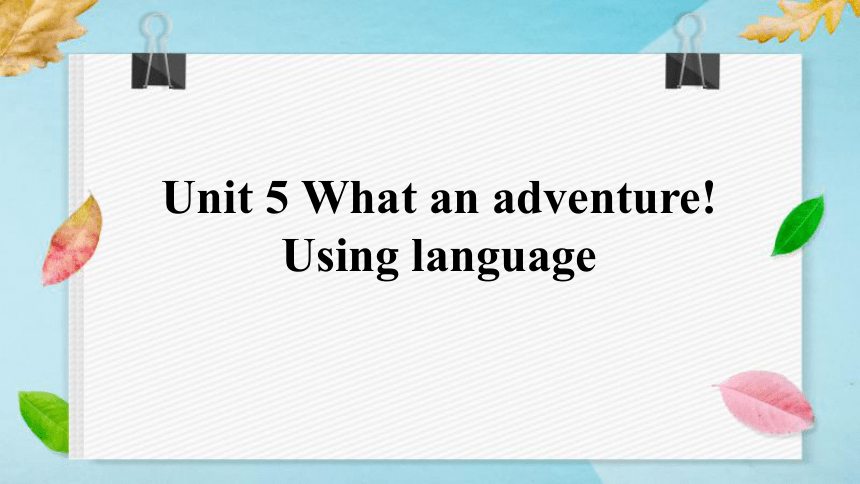 | |
| 格式 | pptx | ||
| 文件大小 | 23.0MB | ||
| 资源类型 | 教案 | ||
| 版本资源 | 外研版(2019) | ||
| 科目 | 英语 | ||
| 更新时间 | 2025-04-27 12:20:30 | ||
图片预览

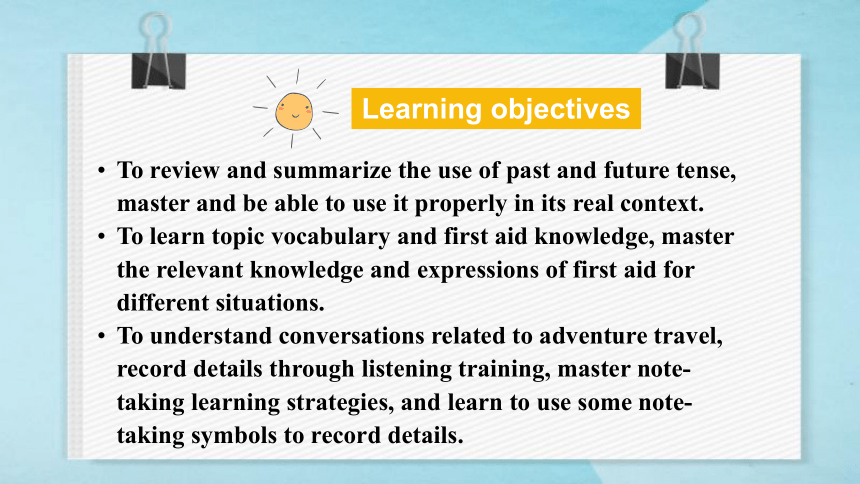
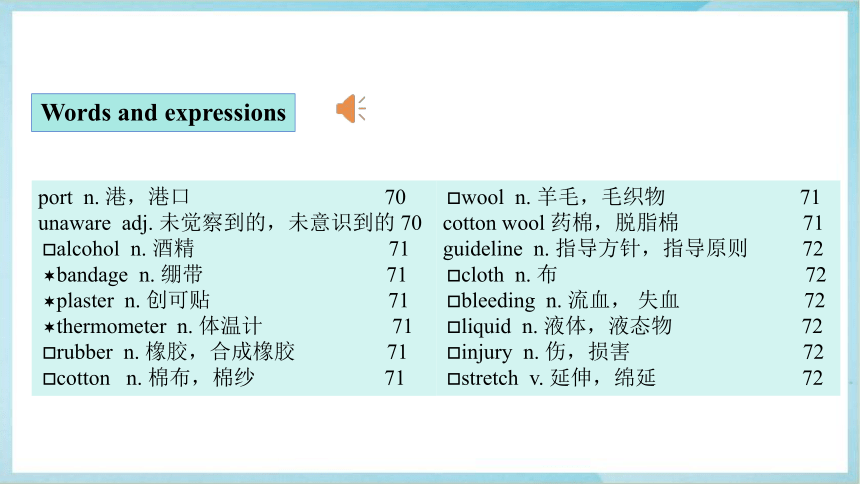

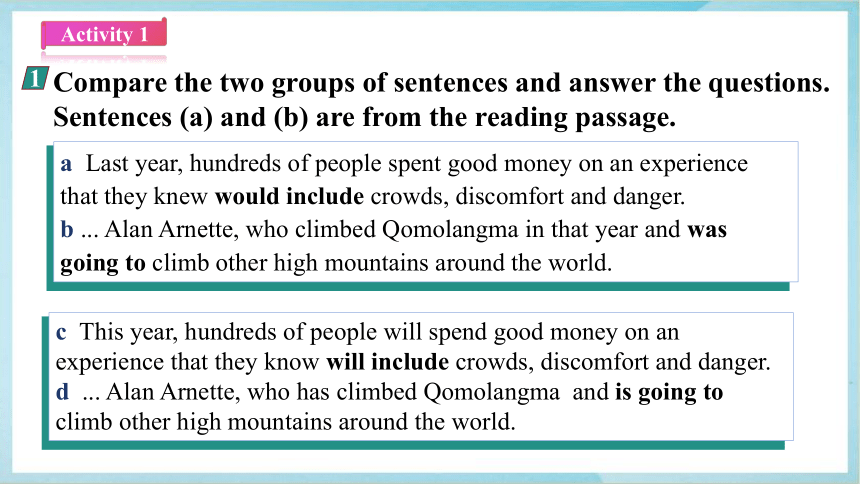
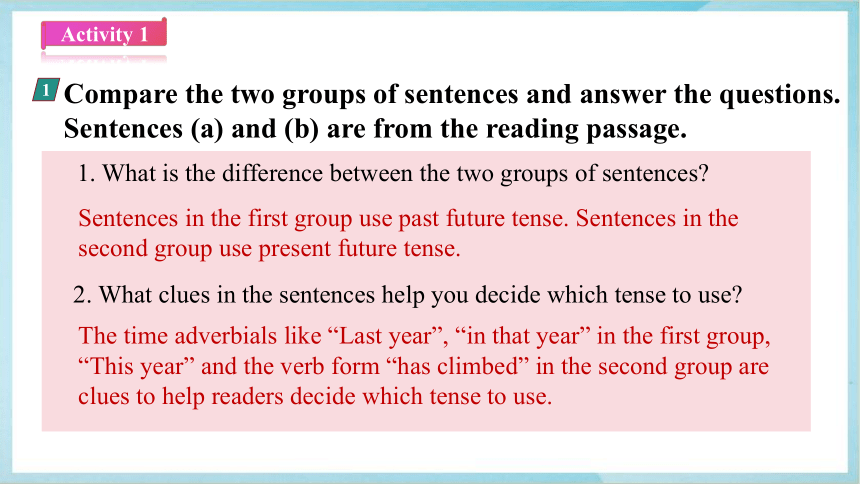

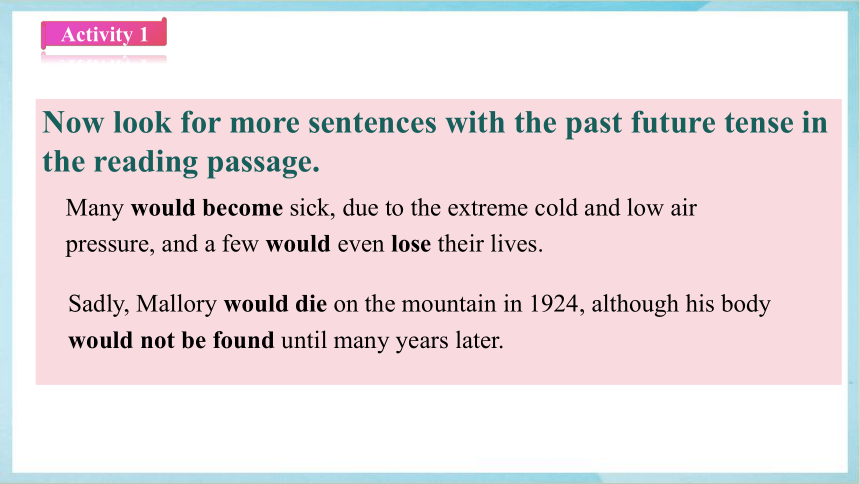

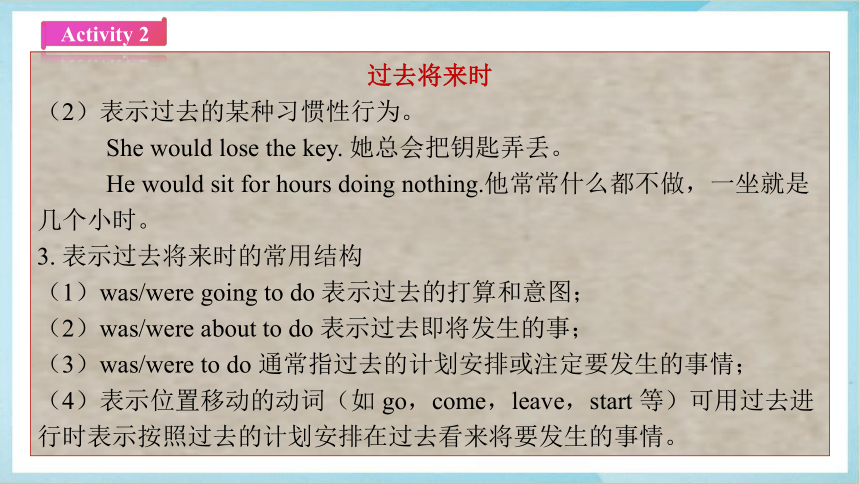
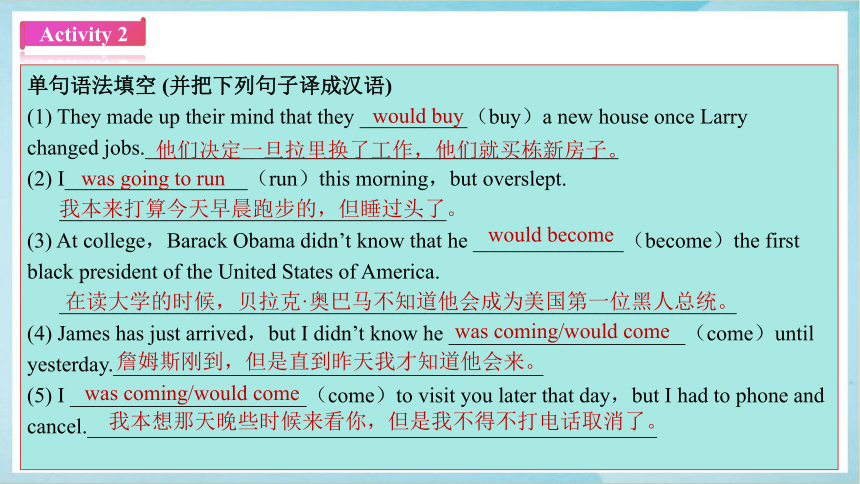
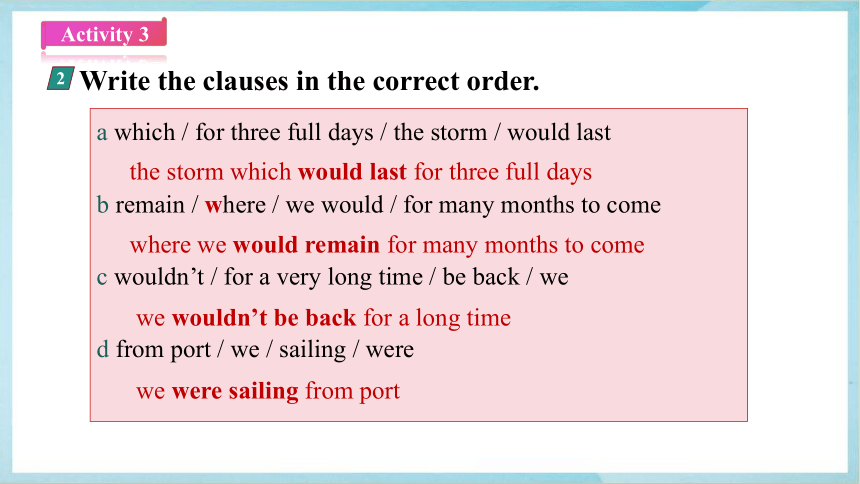
文档简介
(共47张PPT)
Unit 5 What an adventure!
Using language
To review and summarize the use of past and future tense, master and be able to use it properly in its real context.
To learn topic vocabulary and first aid knowledge, master the relevant knowledge and expressions of first aid for different situations.
To understand conversations related to adventure travel, record details through listening training, master note-taking learning strategies, and learn to use some note-taking symbols to record details.
Learning objectives
Words and expressions
port n. 港,港口 70
unaware adj. 未觉察到的,未意识到的 70
alcohol n. 酒精 71
bandage n. 绷带 71
plaster n. 创可贴 71
thermometer n. 体温计 71
rubber n. 橡胶,合成橡胶 71
cotton n. 棉布,棉纱 71
wool n. 羊毛,毛织物 71
cotton wool 药棉,脱脂棉 71
guideline n. 指导方针,指导原则 72
cloth n. 布 72
bleeding n. 流血, 失血 72
liquid n. 液体,液态物 72
injury n. 伤,损害 72
stretch v. 延伸,绵延 72
Past future
过去将来时
a Last year, hundreds of people spent good money on an experience that they knew would include crowds, discomfort and danger.
b ... Alan Arnette, who climbed Qomolangma in that year and was going to climb other high mountains around the world.
c This year, hundreds of people will spend good money on an experience that they know will include crowds, discomfort and danger.
d ... Alan Arnette, who has climbed Qomolangma and is going to climb other high mountains around the world.
Compare the two groups of sentences and answer the questions. Sentences (a) and (b) are from the reading passage.
1
Activity 1
1. What is the difference between the two groups of sentences
2. What clues in the sentences help you decide which tense to use
Sentences in the first group use past future tense. Sentences in the second group use present future tense.
The time adverbials like “Last year”, “in that year” in the first group, “This year” and the verb form “has climbed” in the second group are clues to help readers decide which tense to use.
Compare the two groups of sentences and answer the questions. Sentences (a) and (b) are from the reading passage.
1
Activity 1
3. Match each group of sentences to the correct timeline.
Past
Present
Future
Past
Present
Future
一般将来时 c,d
过去将来时 a,b
Compare the two groups of sentences and answer the questions. Sentences (a) and (b) are from the reading passage.
1
Activity 1
Now look for more sentences with the past future tense in the reading passage.
Many would become sick, due to the extreme cold and low air pressure, and a few would even lose their lives.
Sadly, Mallory would die on the mountain in 1924, although his body would not be found until many years later.
Activity 1
过去将来时
1. 构成:would / should+ 动词原形
2. 用法
(1)表示从过去某一时间看将要发生的动作或存在的状态。常用于主句是一般过去时的宾语从句中,表示从句的动作发生在主句动作之后。常与过去将来时连用的时间状语有 two days(weeks,months...)later,the following day,the next week(month, year ...)等。
She said she would be there at seven o’clock,and he thought she would keep her word. 她说她会在 7 点到达,他认为她会履行诺言。
Activity 2
过去将来时
(2)表示过去的某种习惯性行为。
She would lose the key. 她总会把钥匙弄丢。
He would sit for hours doing nothing.他常常什么都不做,一坐就是几个小时。
3. 表示过去将来时的常用结构
(1)was/were going to do 表示过去的打算和意图;
(2)was/were about to do 表示过去即将发生的事;
(3)was/were to do 通常指过去的计划安排或注定要发生的事情;
(4)表示位置移动的动词(如 go,come,leave,start 等)可用过去进行时表示按照过去的计划安排在过去看来将要发生的事情。
Activity 2
单句语法填空 (并把下列句子译成汉语)
They made up their mind that they __________(buy)a new house once Larry
changed jobs.____________________________________________
(2) I_________________(run)this morning,but overslept.
____________________________________
(3) At college,Barack Obama didn’t know that he ______________(become)the first black president of the United States of America.
_______________________________________________________________
(4) James has just arrived,but I didn’t know he ______________________(come)until yesterday.________________________________________
(5) I ______________________(come)to visit you later that day,but I had to phone and cancel._____________________________________________________
would buy
他们决定一旦拉里换了工作,他们就买栋新房子。
was going to run
我本来打算今天早晨跑步的,但睡过头了。
would become
在读大学的时候,贝拉克·奥巴马不知道他会成为美国第一位黑人总统。
was coming/would come
詹姆斯刚到,但是直到昨天我才知道他会来。
was coming/would come
我本想那天晚些时候来看你,但是我不得不打电话取消了。
Activity 2
a which / for three full days / the storm / would last
b remain / where / we would / for many months to come
c wouldn’t / for a very long time / be back / we
d from port / we / sailing / were
the storm which would last for three full days
where we would remain for many months to come
we wouldn’t be back for a long time
we were sailing from port
Write the clauses in the correct order.
2
Activity 3
Now complete the captain’s memoir with the clauses.
It was spring, and 1 . We were excited --- none of us knew that these would be our final days together. At first, the sea was calm and we spent our days working, fishing and playing cards, happily unaware that 2 . At that point, 3 . was just a few dark clouds on the horizon. Hours later, the waves rose up over our ship, breaking it into two and throwing us overboard. Choking with water, we swam to the nearest island, 4 , hatching plans to escape.
d. we were sailing from port
c. we wouldn’t be back for a long time
a. the storm which would last for three full days
b. where we would remain for many months to come
Activity 3
It was spring, and we were sailing from port. We were excited --- none of us knew that these would be our final days together. At first, the sea was calm and we spent our days working, fishing and playing cards, happily unaware that we wouldn’t be back for a long time. At that point, the storm which would last for three full days was just a few dark clouds on the horizon. Hours later, the waves rose up over our ship, breaking it into two and throwing us overboard. Choking with water, we swam to the nearest island, where we would remain for many months to come, hatching plans to escape.
那是春天,我们正从港口启航。 我们都很兴奋——谁也不知道这将是我们在一起的最后几天。 起初,海面风平浪静,我们每天都在工作、钓鱼、打牌,我们玩得很开心,没有意识到我们会很长一段时间回不来。 那时,这场将持续整整三天的风暴不过是地平线上的几朵乌云。几小时后,大浪把我们的船掀起来,把它劈成两半,把我们抛到海里。我们被水呛得喘不过气来,只好游到最近的一个小岛上,在那里待上几个月,琢磨着逃跑的计划。
memoir / memwɑ (r)/n. 回忆录,自传(memoirs)
knee 膝盖
injure v.受伤
leak v 泄露
bucket 水桶
hammer 锤子
nail 钉子
Imagine you were one of the sailors in Activity 2. Answer the captain’s questions using I was going to ..., but...
3
Activity 4
1. Did you hunt for food
2. Did you collect any water
I was going to hunt for food,
but my knee was wounded.
I was going to collect some water, but I found
the bucket leaked water.
Imagine you were one of the sailors in Activity 2. Answer the captain’s questions using I was going to ..., but...
3
Activity 4
3. Did you put up the tent
4. Did you build a fire
I was going to put up the tent,
but I found I hadn’t got a
hammer and nails.
I was going to build a fire, but suddenly it started to rain.
Imagine you were one of the sailors in Activity 2. Answer the captain’s questions using I was going to ..., but...
3
Activity 4
I was going to hunt for food, but my knee was wounded.
I was going to collect some water, but I found there was a hole in the side of the bucket.
I was going to put up the tent, but I found I hadn’t got a hammer and nails.
I was going to build a fire, but suddenly it started to rain.
Imagine you were one of the sailors in Activity 2. Answer the captain’s questions using I was going to ..., but...
3
Activity 4
First aid
Watch the video and talk about what you should do in an emergency situation.
Activity 5
Essential skills that everyone should know in an
emergency situation.
1. Access the situation.
Make sure the victim and you are both safe.
2. Check if the victim is responsive. If not, take action immediately.
3. Dial the local emergency number first.
4. While waiting, remember the ABCs of first aid.
A:
B:
C:
The airway is clear;
Check for breathing;
Monitor circulation.
Activity 5
Essential skills that everyone should know in an
emergency situation.
5. How to deal with small cuts and scrapes
6. How to deal with burns.
7. What will you do if someone is chocking
Clean the wound with soap and water. Apply an antiseptic and cover it with a sterile dressing to prevent infection.
Immediately cool the infected area for at least ten minutes.
Stand behind them, make a fist above the navel, and perform upward thrusts until the object is expelled.
Activity 5
1 Do you know what they are in the first aid kit
急救箱
急救手册
创口贴
绑带
一次性医用手套
止痛药
镊子+剪刀
保温毯
烫伤膏
温度计
无菌垫
冰袋
别针
Activity 5
Look at the items in the first aid kit and talk about what they are used for. Add anything else that you think would be useful.
4
急救箱
医用棉球
医用手套
体温计
剪刀
止疼药
创可贴
绷带
冰袋
医用酒精
Activity 5
2 Do you know what they are used for
Activity 5
They are used for:
Medical alcohol is used to sterilize the wounded part.
Ice pack is a plastic container filled with ice that is used to cool parts of the body that are injured..
A bandage is a long strip of cloth used for tying around a part of the body that has been hurt in order to protect or support it.
sterilize v. 给……消毒
Activity 5
They are used for:
Painkillers are drugs for relieving pain, which will make you less painful.
A thermometer is used to take a person’s temperature.
Cotton wool is a soft mass of cotton, used especially for applying liquids or creams to your skin.
Plasters are adhesive strips of material for covering cuts and wounds.
adhesive adj. 有黏性的
Activity 5
Complete the first aid guidelines with the words and expressions in Activity 4.
5
Activity 5
ice pack
bandage
cotton wool balls
Complete the first aid guidelines with the words and expressions in Activity 4.
5
Activity 5
thermometer
painkillers
Useful expressions in activity 5.
1.keep the arm still
2.make a sling out of a bandage
3.put pressure on the cut
4.clean out the bleeding area with fresh water or alcohol
5.take one’s temperature
6.cool down
保持手臂静止不动
用绷带做一个悬带
按住伤口
用清水或酒精清理干净出血位置
给某人量体温
使冷却
Activity 5
Work in pairs. Offer first aid advice for injuries or illness in Activity 5. Add any more you can think of.
A: Are you OK What’s the matter
B: I think I’ve broken my arm / wrist / finger. What should I do
...
6
Activity 6
A: Are you OK What’s the matter
B: I think I’ve broken my arm. What should I do
A: Stay calm, don't panic. First, try to find a safe place to sit or lie down. If your arm is bleeding, use a clean cloth to stop the bleeding.
B: Okay, I’ll do that. But it hurts so much!
A: I know it hurts, but try to relax. You can apply a cold compress to the injured area to reduce swelling and pain. Make sure to elevate your arm above your heart if possible.
B: Alright, I’ll try that. Should I take any medicine
A: You can take a painkiller if the pain is severe. But remember to read the instructions carefully before taking it.
B: What if the pain doesn't go away or gets worse
A: If the pain persists or gets worse, or if you notice any numbness or tingling in your arm, you should go to the hospital as soon as possible. They can take an X-ray to check the extent of the injury.
B: Thank you so much for your help, A. I’ll follow your advice.
A: You’re welcome, B. Just remember to stay calm and take care of yourself.
Sample
Activity 6
Amazing road trips
Did you know
China’s National Highway 318, stretching over 5,000 km, runs from Shanghai to Zhangmu, Tibet. It is one of the longest highways in China, and perhaps the most dangerous, too. It is known as the “heavenly road”, both for its amazing views and for its role in boosting the local economy.
Did you know
中国 318 国道从上海到西藏樟木,全长 5000 多公里。这是中国最长的公路之一,也可能是最危险的公路。这条公路被称为 "天堂之路",因为它不仅有令人惊叹的景色,而且还促进了当地经济的发展。
Activity 7
1 Expensive but fun
2 Difficult and unpleasant
3 Challenging but rewarding
Learning to learn
While listening and taking notes, you don’t need to write down every word in full. Using symbols and abbreviations can allow you to take notes more quickly. Next time you need to take notes, try using some of these ∵/ because, ∴/ therefore, 5/ five, ↑/ up, C20/20th century, 20K/ twenty thousand, diff./different.
Listen to the interview and choose the words that best describe the speakers’ expressions.
3
7
Activity 7
When we came back, we were asked a lot of questions
about our adventure. Here we’ll try to answer the most
frequently asked questions.
Why did you do it
We did it to 1 .
A TRIP
ALONG
HIGHWAY
318
How did you prepare
We really practised a lot! If we weren’t studying, we were 2 .
raise money for a children’s charity
cycling
Listen again and complete the blog.
Activity 8
8
When we came back, we were asked a lot of questions about our adventure. Here we’ll try to answer the most frequently asked questions.
Listen again and complete the blog.
What difficulties did you encounter
We had to 3 day after day. We also had to face
4 and dangerous falling rocks.5 started from Chengdu, but three friends got injured.
cycle up mountains
snowy weather
Five of us
Activity 8
8
When we came back, we were asked a lot of questions about our
adventure. Here we’ll try to answer the most frequently asked questions.
Listen again and complete the blog.
8
What did you see
The views were fantastic! The most impressive ones were those of
6 .
How did you feel after the trip
It was the best feeling in the world! We had an adventure, raised some money and 7 to some children’s lives.
the snowy mountains
helped make a difference
Activity 8
Now talk about how the speakers describe their experiences.
Listen again if necessary.
Interviewer: Today I’m talking to Wang Tao and Zhang Jing, who have cycled China’s National Highway 318. Welcome, guys!
Wang&Zhang: Hello!
Interviewer: Now, many young people just want to spend their free time playing and having fun. Instead, you’ve completed a great adventure. Zhang Jing, why did you do it
Activity 8
Zhang Jing: Well, we did it to raise money for a children’s charity. The idea was that people paid to read a blog we wrote every day about our journey. We then gave the money to the charity.
Interviewer: What a great idea! And how did you prepare for it, Wang Tao
Wang Tao: The simple truth is that we practised a lot -- after school, at the weekend, and during holidays. If we weren’t studying, we were cycling.
Interviewer: That’s amazing. Was the trip as difficult as you’d expected
Activity 8
Zhang Jing: Yes, we had so many difficulties! We had to cycle up mountains day after day. We also came across snowy weather and dangerous falling rocks. Five of us started the journey from Chengdu, but only two of us successfully arrived in Lhasa. Our friends got injured and had to give up in Yajiang. That’s really sad.
Interviewer: Despite the difficulties, what was the best thing about your adventure
Activity 8
Wang Tao: The views were fantastic! We saw lots of rivers and lakes during the trip. But the most impressive views were those of the snowy mountains. I’ve never seen such beautiful views in all my life! It’s no wonder it’s called the “heavenly road”.
Interviewer: And how did you feel when you reached the end
Zhang Jing: Great! It was the best feeling in the world. We raised about 2,000 yuan. Although it’s not a huge amount , at least we had an adventure and helped make a difference to some children’s lives!
Interviewer: Thank you for sharing your experience. I’m sure a lot of young people will be inspired by what you have done.
Activity 8
Student A
You and Student B have just come back from two different trips north-to-south across China. You took the following route, visited some scenic spots and tasted some local food:
Qingdao/ Zhangqiao Pier/ seafood
Hangzhou/ West Lake and gardens/ Dongpo Pork
Xiamen/ Gulangyu Island/ fish ball soup
Work in pairs. Act out the conversation to talk about the road trips across China.
9
Activity 9
Student A
Ask Student B about his/her trip and complete the table. Then answer his/her questions about your trip.
Cities he/she went to Places of interest he /she arrived Food
he/she tasted
Work in pairs. Act out the conversation to talk about the road trips across China.
9
Activity 9
Student B
You and Student B have just come back from two different trips north-to-south across China. You took the following route, visited some scenic spots and tasted some local food:
Jiaozuo/ Yuntaishan Geopark/ youcha
Changsha/ Yuelu Mountain/ preserved meat
Gulin/ Lijiang River/ rice noodles
Work in pairs. Act out the conversation to talk about the road trips across China.
9
Activity 9
Student B
Answer Student A’s questions about your trip. Then ask Student A about his/ her trip and complete the table.
Cities he/she went to Places of interest he /she arrived Food
he/she tasted
Work in pairs. Act out the conversation to talk about the road trips across China.
9
Activity 9
Useful expressions:
Activity 9
Homework
1. 掌握过去将来时的使用规律,做同步语法专练。
2. 学习急救知识,用英语表达简易急救常识。
Unit 5 What an adventure!
Using language
To review and summarize the use of past and future tense, master and be able to use it properly in its real context.
To learn topic vocabulary and first aid knowledge, master the relevant knowledge and expressions of first aid for different situations.
To understand conversations related to adventure travel, record details through listening training, master note-taking learning strategies, and learn to use some note-taking symbols to record details.
Learning objectives
Words and expressions
port n. 港,港口 70
unaware adj. 未觉察到的,未意识到的 70
alcohol n. 酒精 71
bandage n. 绷带 71
plaster n. 创可贴 71
thermometer n. 体温计 71
rubber n. 橡胶,合成橡胶 71
cotton n. 棉布,棉纱 71
wool n. 羊毛,毛织物 71
cotton wool 药棉,脱脂棉 71
guideline n. 指导方针,指导原则 72
cloth n. 布 72
bleeding n. 流血, 失血 72
liquid n. 液体,液态物 72
injury n. 伤,损害 72
stretch v. 延伸,绵延 72
Past future
过去将来时
a Last year, hundreds of people spent good money on an experience that they knew would include crowds, discomfort and danger.
b ... Alan Arnette, who climbed Qomolangma in that year and was going to climb other high mountains around the world.
c This year, hundreds of people will spend good money on an experience that they know will include crowds, discomfort and danger.
d ... Alan Arnette, who has climbed Qomolangma and is going to climb other high mountains around the world.
Compare the two groups of sentences and answer the questions. Sentences (a) and (b) are from the reading passage.
1
Activity 1
1. What is the difference between the two groups of sentences
2. What clues in the sentences help you decide which tense to use
Sentences in the first group use past future tense. Sentences in the second group use present future tense.
The time adverbials like “Last year”, “in that year” in the first group, “This year” and the verb form “has climbed” in the second group are clues to help readers decide which tense to use.
Compare the two groups of sentences and answer the questions. Sentences (a) and (b) are from the reading passage.
1
Activity 1
3. Match each group of sentences to the correct timeline.
Past
Present
Future
Past
Present
Future
一般将来时 c,d
过去将来时 a,b
Compare the two groups of sentences and answer the questions. Sentences (a) and (b) are from the reading passage.
1
Activity 1
Now look for more sentences with the past future tense in the reading passage.
Many would become sick, due to the extreme cold and low air pressure, and a few would even lose their lives.
Sadly, Mallory would die on the mountain in 1924, although his body would not be found until many years later.
Activity 1
过去将来时
1. 构成:would / should+ 动词原形
2. 用法
(1)表示从过去某一时间看将要发生的动作或存在的状态。常用于主句是一般过去时的宾语从句中,表示从句的动作发生在主句动作之后。常与过去将来时连用的时间状语有 two days(weeks,months...)later,the following day,the next week(month, year ...)等。
She said she would be there at seven o’clock,and he thought she would keep her word. 她说她会在 7 点到达,他认为她会履行诺言。
Activity 2
过去将来时
(2)表示过去的某种习惯性行为。
She would lose the key. 她总会把钥匙弄丢。
He would sit for hours doing nothing.他常常什么都不做,一坐就是几个小时。
3. 表示过去将来时的常用结构
(1)was/were going to do 表示过去的打算和意图;
(2)was/were about to do 表示过去即将发生的事;
(3)was/were to do 通常指过去的计划安排或注定要发生的事情;
(4)表示位置移动的动词(如 go,come,leave,start 等)可用过去进行时表示按照过去的计划安排在过去看来将要发生的事情。
Activity 2
单句语法填空 (并把下列句子译成汉语)
They made up their mind that they __________(buy)a new house once Larry
changed jobs.____________________________________________
(2) I_________________(run)this morning,but overslept.
____________________________________
(3) At college,Barack Obama didn’t know that he ______________(become)the first black president of the United States of America.
_______________________________________________________________
(4) James has just arrived,but I didn’t know he ______________________(come)until yesterday.________________________________________
(5) I ______________________(come)to visit you later that day,but I had to phone and cancel._____________________________________________________
would buy
他们决定一旦拉里换了工作,他们就买栋新房子。
was going to run
我本来打算今天早晨跑步的,但睡过头了。
would become
在读大学的时候,贝拉克·奥巴马不知道他会成为美国第一位黑人总统。
was coming/would come
詹姆斯刚到,但是直到昨天我才知道他会来。
was coming/would come
我本想那天晚些时候来看你,但是我不得不打电话取消了。
Activity 2
a which / for three full days / the storm / would last
b remain / where / we would / for many months to come
c wouldn’t / for a very long time / be back / we
d from port / we / sailing / were
the storm which would last for three full days
where we would remain for many months to come
we wouldn’t be back for a long time
we were sailing from port
Write the clauses in the correct order.
2
Activity 3
Now complete the captain’s memoir with the clauses.
It was spring, and 1 . We were excited --- none of us knew that these would be our final days together. At first, the sea was calm and we spent our days working, fishing and playing cards, happily unaware that 2 . At that point, 3 . was just a few dark clouds on the horizon. Hours later, the waves rose up over our ship, breaking it into two and throwing us overboard. Choking with water, we swam to the nearest island, 4 , hatching plans to escape.
d. we were sailing from port
c. we wouldn’t be back for a long time
a. the storm which would last for three full days
b. where we would remain for many months to come
Activity 3
It was spring, and we were sailing from port. We were excited --- none of us knew that these would be our final days together. At first, the sea was calm and we spent our days working, fishing and playing cards, happily unaware that we wouldn’t be back for a long time. At that point, the storm which would last for three full days was just a few dark clouds on the horizon. Hours later, the waves rose up over our ship, breaking it into two and throwing us overboard. Choking with water, we swam to the nearest island, where we would remain for many months to come, hatching plans to escape.
那是春天,我们正从港口启航。 我们都很兴奋——谁也不知道这将是我们在一起的最后几天。 起初,海面风平浪静,我们每天都在工作、钓鱼、打牌,我们玩得很开心,没有意识到我们会很长一段时间回不来。 那时,这场将持续整整三天的风暴不过是地平线上的几朵乌云。几小时后,大浪把我们的船掀起来,把它劈成两半,把我们抛到海里。我们被水呛得喘不过气来,只好游到最近的一个小岛上,在那里待上几个月,琢磨着逃跑的计划。
memoir / memwɑ (r)/n. 回忆录,自传(memoirs)
knee 膝盖
injure v.受伤
leak v 泄露
bucket 水桶
hammer 锤子
nail 钉子
Imagine you were one of the sailors in Activity 2. Answer the captain’s questions using I was going to ..., but...
3
Activity 4
1. Did you hunt for food
2. Did you collect any water
I was going to hunt for food,
but my knee was wounded.
I was going to collect some water, but I found
the bucket leaked water.
Imagine you were one of the sailors in Activity 2. Answer the captain’s questions using I was going to ..., but...
3
Activity 4
3. Did you put up the tent
4. Did you build a fire
I was going to put up the tent,
but I found I hadn’t got a
hammer and nails.
I was going to build a fire, but suddenly it started to rain.
Imagine you were one of the sailors in Activity 2. Answer the captain’s questions using I was going to ..., but...
3
Activity 4
I was going to hunt for food, but my knee was wounded.
I was going to collect some water, but I found there was a hole in the side of the bucket.
I was going to put up the tent, but I found I hadn’t got a hammer and nails.
I was going to build a fire, but suddenly it started to rain.
Imagine you were one of the sailors in Activity 2. Answer the captain’s questions using I was going to ..., but...
3
Activity 4
First aid
Watch the video and talk about what you should do in an emergency situation.
Activity 5
Essential skills that everyone should know in an
emergency situation.
1. Access the situation.
Make sure the victim and you are both safe.
2. Check if the victim is responsive. If not, take action immediately.
3. Dial the local emergency number first.
4. While waiting, remember the ABCs of first aid.
A:
B:
C:
The airway is clear;
Check for breathing;
Monitor circulation.
Activity 5
Essential skills that everyone should know in an
emergency situation.
5. How to deal with small cuts and scrapes
6. How to deal with burns.
7. What will you do if someone is chocking
Clean the wound with soap and water. Apply an antiseptic and cover it with a sterile dressing to prevent infection.
Immediately cool the infected area for at least ten minutes.
Stand behind them, make a fist above the navel, and perform upward thrusts until the object is expelled.
Activity 5
1 Do you know what they are in the first aid kit
急救箱
急救手册
创口贴
绑带
一次性医用手套
止痛药
镊子+剪刀
保温毯
烫伤膏
温度计
无菌垫
冰袋
别针
Activity 5
Look at the items in the first aid kit and talk about what they are used for. Add anything else that you think would be useful.
4
急救箱
医用棉球
医用手套
体温计
剪刀
止疼药
创可贴
绷带
冰袋
医用酒精
Activity 5
2 Do you know what they are used for
Activity 5
They are used for:
Medical alcohol is used to sterilize the wounded part.
Ice pack is a plastic container filled with ice that is used to cool parts of the body that are injured..
A bandage is a long strip of cloth used for tying around a part of the body that has been hurt in order to protect or support it.
sterilize v. 给……消毒
Activity 5
They are used for:
Painkillers are drugs for relieving pain, which will make you less painful.
A thermometer is used to take a person’s temperature.
Cotton wool is a soft mass of cotton, used especially for applying liquids or creams to your skin.
Plasters are adhesive strips of material for covering cuts and wounds.
adhesive adj. 有黏性的
Activity 5
Complete the first aid guidelines with the words and expressions in Activity 4.
5
Activity 5
ice pack
bandage
cotton wool balls
Complete the first aid guidelines with the words and expressions in Activity 4.
5
Activity 5
thermometer
painkillers
Useful expressions in activity 5.
1.keep the arm still
2.make a sling out of a bandage
3.put pressure on the cut
4.clean out the bleeding area with fresh water or alcohol
5.take one’s temperature
6.cool down
保持手臂静止不动
用绷带做一个悬带
按住伤口
用清水或酒精清理干净出血位置
给某人量体温
使冷却
Activity 5
Work in pairs. Offer first aid advice for injuries or illness in Activity 5. Add any more you can think of.
A: Are you OK What’s the matter
B: I think I’ve broken my arm / wrist / finger. What should I do
...
6
Activity 6
A: Are you OK What’s the matter
B: I think I’ve broken my arm. What should I do
A: Stay calm, don't panic. First, try to find a safe place to sit or lie down. If your arm is bleeding, use a clean cloth to stop the bleeding.
B: Okay, I’ll do that. But it hurts so much!
A: I know it hurts, but try to relax. You can apply a cold compress to the injured area to reduce swelling and pain. Make sure to elevate your arm above your heart if possible.
B: Alright, I’ll try that. Should I take any medicine
A: You can take a painkiller if the pain is severe. But remember to read the instructions carefully before taking it.
B: What if the pain doesn't go away or gets worse
A: If the pain persists or gets worse, or if you notice any numbness or tingling in your arm, you should go to the hospital as soon as possible. They can take an X-ray to check the extent of the injury.
B: Thank you so much for your help, A. I’ll follow your advice.
A: You’re welcome, B. Just remember to stay calm and take care of yourself.
Sample
Activity 6
Amazing road trips
Did you know
China’s National Highway 318, stretching over 5,000 km, runs from Shanghai to Zhangmu, Tibet. It is one of the longest highways in China, and perhaps the most dangerous, too. It is known as the “heavenly road”, both for its amazing views and for its role in boosting the local economy.
Did you know
中国 318 国道从上海到西藏樟木,全长 5000 多公里。这是中国最长的公路之一,也可能是最危险的公路。这条公路被称为 "天堂之路",因为它不仅有令人惊叹的景色,而且还促进了当地经济的发展。
Activity 7
1 Expensive but fun
2 Difficult and unpleasant
3 Challenging but rewarding
Learning to learn
While listening and taking notes, you don’t need to write down every word in full. Using symbols and abbreviations can allow you to take notes more quickly. Next time you need to take notes, try using some of these ∵/ because, ∴/ therefore, 5/ five, ↑/ up, C20/20th century, 20K/ twenty thousand, diff./different.
Listen to the interview and choose the words that best describe the speakers’ expressions.
3
7
Activity 7
When we came back, we were asked a lot of questions
about our adventure. Here we’ll try to answer the most
frequently asked questions.
Why did you do it
We did it to 1 .
A TRIP
ALONG
HIGHWAY
318
How did you prepare
We really practised a lot! If we weren’t studying, we were 2 .
raise money for a children’s charity
cycling
Listen again and complete the blog.
Activity 8
8
When we came back, we were asked a lot of questions about our adventure. Here we’ll try to answer the most frequently asked questions.
Listen again and complete the blog.
What difficulties did you encounter
We had to 3 day after day. We also had to face
4 and dangerous falling rocks.5 started from Chengdu, but three friends got injured.
cycle up mountains
snowy weather
Five of us
Activity 8
8
When we came back, we were asked a lot of questions about our
adventure. Here we’ll try to answer the most frequently asked questions.
Listen again and complete the blog.
8
What did you see
The views were fantastic! The most impressive ones were those of
6 .
How did you feel after the trip
It was the best feeling in the world! We had an adventure, raised some money and 7 to some children’s lives.
the snowy mountains
helped make a difference
Activity 8
Now talk about how the speakers describe their experiences.
Listen again if necessary.
Interviewer: Today I’m talking to Wang Tao and Zhang Jing, who have cycled China’s National Highway 318. Welcome, guys!
Wang&Zhang: Hello!
Interviewer: Now, many young people just want to spend their free time playing and having fun. Instead, you’ve completed a great adventure. Zhang Jing, why did you do it
Activity 8
Zhang Jing: Well, we did it to raise money for a children’s charity. The idea was that people paid to read a blog we wrote every day about our journey. We then gave the money to the charity.
Interviewer: What a great idea! And how did you prepare for it, Wang Tao
Wang Tao: The simple truth is that we practised a lot -- after school, at the weekend, and during holidays. If we weren’t studying, we were cycling.
Interviewer: That’s amazing. Was the trip as difficult as you’d expected
Activity 8
Zhang Jing: Yes, we had so many difficulties! We had to cycle up mountains day after day. We also came across snowy weather and dangerous falling rocks. Five of us started the journey from Chengdu, but only two of us successfully arrived in Lhasa. Our friends got injured and had to give up in Yajiang. That’s really sad.
Interviewer: Despite the difficulties, what was the best thing about your adventure
Activity 8
Wang Tao: The views were fantastic! We saw lots of rivers and lakes during the trip. But the most impressive views were those of the snowy mountains. I’ve never seen such beautiful views in all my life! It’s no wonder it’s called the “heavenly road”.
Interviewer: And how did you feel when you reached the end
Zhang Jing: Great! It was the best feeling in the world. We raised about 2,000 yuan. Although it’s not a huge amount , at least we had an adventure and helped make a difference to some children’s lives!
Interviewer: Thank you for sharing your experience. I’m sure a lot of young people will be inspired by what you have done.
Activity 8
Student A
You and Student B have just come back from two different trips north-to-south across China. You took the following route, visited some scenic spots and tasted some local food:
Qingdao/ Zhangqiao Pier/ seafood
Hangzhou/ West Lake and gardens/ Dongpo Pork
Xiamen/ Gulangyu Island/ fish ball soup
Work in pairs. Act out the conversation to talk about the road trips across China.
9
Activity 9
Student A
Ask Student B about his/her trip and complete the table. Then answer his/her questions about your trip.
Cities he/she went to Places of interest he /she arrived Food
he/she tasted
Work in pairs. Act out the conversation to talk about the road trips across China.
9
Activity 9
Student B
You and Student B have just come back from two different trips north-to-south across China. You took the following route, visited some scenic spots and tasted some local food:
Jiaozuo/ Yuntaishan Geopark/ youcha
Changsha/ Yuelu Mountain/ preserved meat
Gulin/ Lijiang River/ rice noodles
Work in pairs. Act out the conversation to talk about the road trips across China.
9
Activity 9
Student B
Answer Student A’s questions about your trip. Then ask Student A about his/ her trip and complete the table.
Cities he/she went to Places of interest he /she arrived Food
he/she tasted
Work in pairs. Act out the conversation to talk about the road trips across China.
9
Activity 9
Useful expressions:
Activity 9
Homework
1. 掌握过去将来时的使用规律,做同步语法专练。
2. 学习急救知识,用英语表达简易急救常识。
